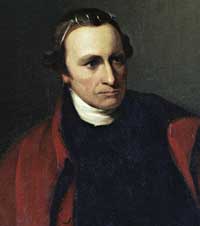
Patrick Henry
Free speech is under fire.In January, 12 died in the attack on Charlie Hebdo, the satirical French magazine, which had published many articles and illustrations mocking Islam.
In November, Sony was hacked, allegedly by the North Korean government, prior to the release of a comedy about a plot to assassinate its leader Kim Jong-un.
Will terrorism, including cyberterrrorism, succeed in limiting free speech and a free press? Will the media and citizens, fearing such attacks, censor itself and limit the diversity of opinions expressed?
How can we assure our rights are protected?
The founders could not have anticipated cyberterrorism, but they certainly appreciated the importance of freedom of speech. When Patrick Henry addressed the Virginia House of Burgesses in Williamsburg in 1765 to protest the Stamp Act, more conservative members interrupted his speech with cries of “Treason.”
Henry would not be silenced, proclaiming: “If this be treason, make the most of it.” Thomas Jefferson later recalled: “I well remember the cry of treason, the pause of Mr. Henry at the name of George III, and the presence of mind with which he closed his sentence, and baffled the charge vociferated.”
When the Virginia ratifying convention convened in 1788, Henry was among the Anti-Federalists. Among Henry’s reasons for opposing the proposed Constitution was its lack of a bill of rights to guarantee, among other rights, freedom of speech.
“I conceive the republic to be in extreme danger,” Henry told the delegates. “If a wrong step be made now, the Republic may be lost forever. If this new government will not come up to the expectation of the people … their liberty will be lost, and tyranny must and will arise.”
Patrick Henry was not one to censor his own opinions, many of which were considered extreme. Today, whether out of a sense of prudence in the face of threats or mere politeness, should we watch our tongues?
Or is free speech the kind of right that is only realized by pushing its boundaries? Are we defending the rights of others to say outrageous things? Where should we draw the line?

Leave a Reply